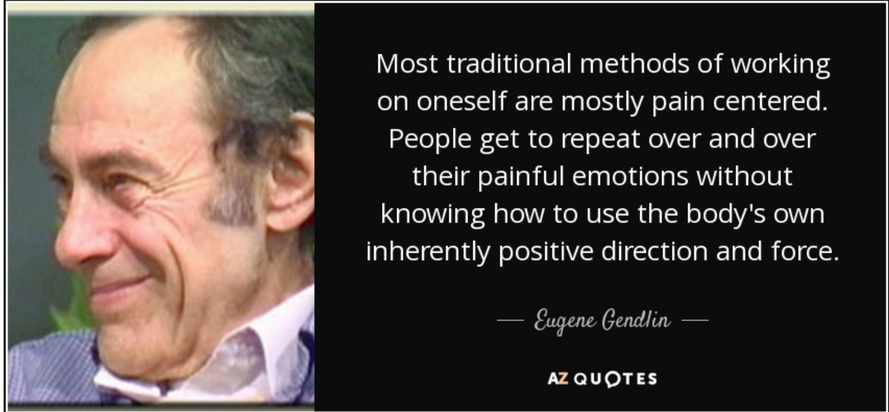focusing
Focusing is a body-oriented psychotherapy, developed by Eugene Gendlin, that allows deeper access to innate wisdom and guidance, and helps clarify next steps.
An example: you may sense that you feel angry about something. You say, "I am angry about this" which brings some relief, but there is more. The usual "feelings" words like sad, mad or frustrated don't quite capture the whole of it. This is where traditional therapy often stops, leaving us feeling stuck. In Focusing Oriented Therapy, we cultivate an attitude of patience, curiosity and unconditional friendliness towards what is vague and fuzzy in us; our body-mind's holistic "felt sense" of a person, relationship, situation or problem. Focusing and the concept of "felt sense" were developed by Eugene Gendlin. click HERE to read more about Focusing Oriented Therapy and HERE to visit The Focusing Institute. Focusing is practiced around the world by people in pairs and groups outside of a therapeutic context. Check the Web site or consult with me for more information. |
parts work
We are whole beings, but at the same time, there are many parts of us.
"A part of me wants to do this, but another part of me thinks I shouldn't want to do that. " We aren't monoliths! So often we feel compelled to force a single conclusion about who we are, how we feel or what we want to (or should) do. By acknowledging, making room for and hearing from all of the different -- and often conflicting -- parts of us, we gain a fuller sense of what is true in any moment. Cultivating an attitude of friendliness and curiosity towards all of our "parts" - especially those we don't like or want to know - can help us to relate to ourselves and others with greater understanding, ease, kindness, compassion and acceptance. "Hearing from" parts promotes forward movement whereas silencing, ignoring or "transcending" them can result in confusion and stuckness. Ignored parts can undermine our ability to attain and maintain progress. We cannot possibly experience our wholeness without befriending and attending to our exiled parts. Parts work comes from the IFS (Internal Family Systems) model developed by Richard Schwartz, Ph.D. Click HERE to learn more about it. |

